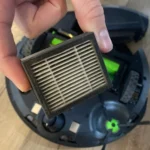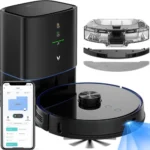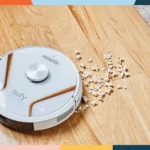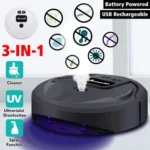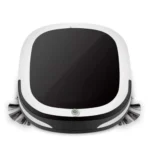It’s a dilemma that plagues every household: to keep the floors clean, what’s the better choice—robot vacuum cleaners or manual vacuum cleaners? The decision not only boils down to personal preference but also depends on several factors such as performance, convenience, and price. While manual vacuum cleaners have been in use for ages and are tried and tested, robot vacuum cleaners have gained popularity in recent years. Both options have their pros and cons, and in this article, we will explore them to help you make an informed decision on which one is the smarter choice. So, let’s dive in!
Robot Vacuum Cleaners
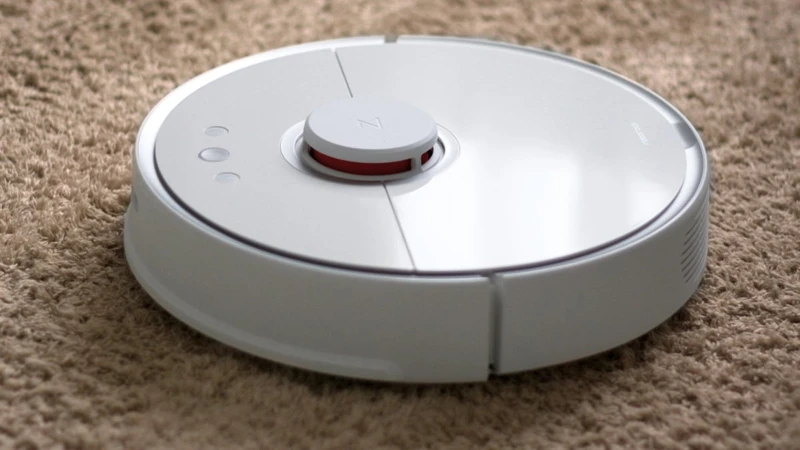
When it comes to cleaning the house, we all face the same problem – spending time on vacuuming. However, what if there was a smarter way to clean? Enter robot vacuum cleaners, the latest technological advancement in home cleaning. They offer an automated and efficient cleaning process that saves you precious time and effort. But how do they compare to traditional manual vacuum cleaners? Let’s dive into the pros and cons of using robot vacuum cleaners. For more on the smart technology behind these devices, check out our article on smart vacuum cleaner tech.
Pros
Robot Vacuum Cleaners have many features that make them a popular choice among homeowners. They are equipped with powerful motors, smart navigation sensors and algorithms that enable them to clean effectively and efficiently.
No More Manual Labor: One of the biggest pros of Robot Vacuum Cleaners is that they require minimal manual effort. You don’t have to move furniture, lift or push the vacuum around, or even be at home to operate it. You can simply set it up with a cleaning schedule that suits you, and let it do its work, leaving you with more leisure time.
Effective Cleaning with Smart Algorithms: Robot Vacuum Cleaners are designed with advanced algorithms that enable them to map out the area to be cleaned, so they don’t miss a spot. These algorithms can recognize specific obstacles and use features like Smart Navigation Sensors to bypass them. This means that the vacuum can navigate under furniture or around corners, with ease, resulting in a more thorough and effective cleaning.
App-Based Control: Many Robot Vacuum Cleaners come with app-based control, which allows you to control them from your smartphone or tablet. This feature provides you with greater convenience, freedom and flexibility. You can set or adjust cleaning schedules, track the cleaning progress, and even get alerts when the device needs attention.
Voice Assistants: Some even have voice assistance, allowing you to use voice commands to control the device from a distance without the need to use an app or store data on your phone. Isn’t it amazing?
| Pros |
|---|
| No More Manual Labor |
| Effective Cleaning with Smart Algorithms |
| App-Based Control |
| Voice Assistance Speakers |
Robot Vacuum Cleaners bring with them many advantages that make them an excellent choice for today’s modern homes. Their smart algorithms, navigation sensors, app-based controls, and voice assistants make cleaning more manageable, hassle-free, and quicker. You could read more about Smart Navigation Sensors on this page.
Cons
Manual vacuum cleaners come with their own shortcomings that may make it difficult to keep up with cleaning tasks in the home. Here are some cons of manual vacuum cleaners that are worth mentioning:
- Physical Effort: Manual vacuum cleaners require physical exertion, and this can be a major con for many people. Pushing, pulling, and lifting the vacuum around the house can be especially tiring for elderly people or those with mobility issues.
- No Smart Features: Manual vacuum cleaners lack smart features such as smart navigation sensors or algorithms that can detect dirt and debris. These cleaners may not be as effective in cleaning hard to reach places or detecting hidden dirt and debris.
- Requires Time and Effort: Vacuum cleaning with a manual vacuum cleaner is a time-consuming and effort-intensive task that may take a toll on your daily routine. You would have to make time to clean your entire house manually, and this can be especially cumbersome if you have a large home.
- Limited Cleaning Coverage: Without the ability to traverse smartly and access hard-to-reach spots, manual vacuum cleaners may not be able to give a complete clean. This leaves certain spots neglected and makes the cleaning process incomplete.
While manual vacuum cleaners do have their cons, advancements in smart home technology have brought many new innovations and features to the vacuum cleaner industry. Smart vacuum cleaners with advanced features like smart navigation sensors or app-based controls, to name a few, are becoming more popular due to the ease and convenience they offer. You may want to check out some smart vacuum cleaner options in the market, such as those with, smart navigation sensors, app-based controls, voice assistants, and advanced smart vacuum algorithms.
Manual Vacuum Cleaners
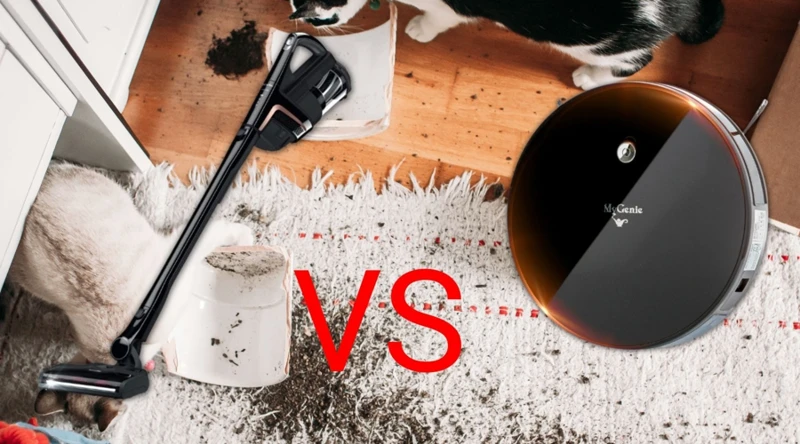
Are you tired of your home’s mysterious dust bunnies and inconveniently placed debris? Say hello to Manual Vacuum Cleaners, the traditional way of keeping your floors and carpets pristine. With their familiar design and easy-to-use features, manual vacuums have been a household staple for decades. But how do they stack up against newer, more technologically advanced robot vacuum cleaners? Let’s take a closer look at the pros and cons of manual vacuums.
Pros
When it comes to the pros of robot vacuum cleaners, there are several factors that make them an attractive option for those who want to keep their homes clean with minimal effort. Here are some of the most notable pros of robot vacuum cleaners:
| Convenience | Robot vacuum cleaners are incredibly convenient, particularly for those who lead busy lives. With these devices, you can simply set them to clean and let them do their job while you go about your day. Many models can also be controlled using a smartphone app or voice commands, making them even more convenient to use. |
| Ease of use | Robot vacuum cleaners are generally very easy to use, often requiring nothing more than the press of a button. They can navigate around your home on their own, and many models can be programmed to clean at specific times or in specific areas of your home. |
| Efficiency | Robot vacuum cleaners are designed to be efficient, using various sensors and technologies to navigate around obstacles, avoid falling down stairs, and clean various surfaces effectively. Many models also have a long battery life, enabling them to clean for extended periods without needing to be recharged. |
| Time-saving | One of the biggest pros of robot vacuum cleaners is that they can save you a lot of time. Rather than spending hours each week vacuuming your floors, you can set your robot vacuum cleaner to do the job for you, freeing up time for other activities. |
Of course, while robot vacuum cleaners have many pros, they also have some cons to consider. Let’s take a closer look at some of the cons of robot vacuum cleaners in the following section.
Cons
When it comes to cons of robot vacuum cleaners, there are some important points that you need to know before investing in one. Here is a detailed list of the main drawbacks:
| Cons | Explanation |
| Limited Battery Life | Robot vacuum cleaners need to be charged frequently as they come with a limited battery life. Some models can only function for less than an hour before they need to be recharged. |
| Expensive | Robot vacuum cleaners are generally more costly compared to manual vacuum cleaners. They may require additional accessories or replacements, such as filters or brushes, which can further increase the overall cost. |
| Inability to Fully Clean Corners or Tight Spaces | Due to their design, robot vacuum cleaners may struggle to reach and clean tight spaces, such as corners or narrow areas. They may also fail to pick up dirt and debris which gets stuck in uneven surfaces. |
| Noisy | Robot vacuum cleaners can be loud, which may disturb you or your family members while they are cleaning. |
| Lack of Personalization | Robot vacuum cleaners operate on pre-set commands, so they may not be as efficient or thorough as manual vacuum cleaners. Also, they may not be able to adapt to different cleaning requirements or preferences. |
Despite these cons, robot vacuum cleaners can still be an excellent investment for anyone looking to save time and effort when it comes to cleaning their homes. Keep in mind that the benefits of using one still outweigh its drawbacks. But, it is up to you to decide what is the most suitable option based on your cleaning needs and budget.
Comparison
Now that we have taken a closer look at the individual features of robot vacuum cleaners and manual vacuum cleaners, it’s time to compare them side-by-side. This will help us understand which option is the better choice for our homes. Let’s dive into the details and compare the performance, convenience, and price of these two types of cleaning devices to determine which one comes out on top.
Performance
When it comes to performance, both robot vacuum cleaners and manual vacuum cleaners have their strengths and weaknesses. Let’s dive deeper and compare them through different aspects.
Cleaning Efficiency:
Robot vacuum cleaners are equipped with advanced sensors and mapping technologies, which allow them to navigate around obstacles, go under furniture and detect dirtier areas. They can easily reach spots that a manual cleaner might miss, resulting in a more thorough clean. However, due to their smaller size and limited suction power, they may not be as effective when it comes to deep cleaning carpets and removing tough stains as compared to manual vacuum cleaners.
Noise:
Manual vacuum cleaners can be noisy, especially those with higher suction power. Robot vacuum cleaners are generally quieter, making them an ideal choice for those who prefer less sound pollution.
Time:
Robot vacuum cleaners can clean your house while you’re away, so you can come back to a clean house without any effort. On the other hand, manual vacuum cleaners require you to do the work yourself, which may take up a significant amount of time, especially if you have a large home.
Customization:
Manual vacuum cleaners offer more customization options, such as adjustable suction power, interchangeable brushes, and extra attachments, allowing you to tweak your cleaning process according to your needs. With robot vacuum cleaners, you have limited control over the cleaning process, although some models do offer scheduling and remote control features.
Accessibility:
Robot vacuum cleaners are a great option for the elderly or disabled who have difficulty operating manual cleaners. They are also a convenient option for people with busy schedules who need a clean home without spending too much time on house cleaning chores.
Both robot and manual vacuum cleaners offer good cleaning performance depending on their strengths and weaknesses. Robot vacuum cleaners may be more efficient in terms of navigating through obstacles, less noisy, and more accessible for some individuals, whereas manual cleaners offer more customization options and deeper carpet cleaning.
Convenience
When it comes to convenience, there’s no doubt that robot vacuum cleaners have the upper hand over manual vacuum cleaners. Let’s take a closer look at why:
| Robot Vacuum Cleaners | Manual Vacuum Cleaners | |
|---|---|---|
| Time | Robot vacuums do the job automatically, freeing up your time for more important tasks. | Manual vacuum cleaners require your time and effort to operate effectively. |
| Noise | Robot vacuums are generally quieter than manual vacuums, making them a great choice for those who want a cleaning solution that won’t disturb their daily routine. | Manual vacuum cleaners can be quite loud, which can be a drawback for some users. |
| Flexibility | Robot vacuums can easily navigate through tight spaces and under furniture, making them highly flexible when it comes to cleaning your home. | Manual vacuum cleaners can be more difficult to maneuver and may not be able to reach certain areas of your home. |
As we can see from the table above, robot vacuum cleaners are the more convenient option when it comes to cleaning your home. They require less time and effort on your part and are generally more flexible in terms of where they can clean. Additionally, robot vacuums are quieter than manual vacuums, which can be beneficial for those who don’t want to be disturbed by loud noises while they work, relax or sleep.
Price
When it comes to the price, robot vacuum cleaners and manual vacuum cleaners come with different price ranges. Generally, robot vacuums are more expensive than manual vacuums, but there are exceptions. Below are some factors you should consider before making a purchase:
- Features: Robot vacuum cleaners come with advanced features such as mapping, scheduling, and automatic charging. These features raise the overall price of the robot vacuum. Meanwhile, manual vacuum cleaners come with basic features, which make them affordable.
- Brand: The brand of the vacuum cleaner can affect the price. For instance, a high-end brand of manual vacuum cleaner can be more expensive than a mid-range robot vacuum cleaner.
- Durability and maintenance: Robot vacuum cleaners come with more built-in technology and parts that require careful handling and maintenance to keep them working optimally. This added cost of maintenance can raise the overall price of a robot vacuum compared to a manual vacuum cleaner.
- Special requirements: If you have special cleaning requirements such as pet hair removal or allergy control, you may need to invest in a vacuum cleaner with specific features that can accommodate those needs. These special features may add to the overall cost of the vacuum cleaner.
Before making a purchase, you should carefully consider your cleaning needs, maintenance preferences, and budget. While robot vacuum cleaners generally come with advanced features, they can be expensive compared to manual vacuum cleaners with basic features. Alternatively, manual vacuum cleaners may be cheaper and more suitable for those with basic cleaning needs.
Conclusion
After comparing the pros and cons of robot vacuum cleaners and manual vacuum cleaners, it’s clear that each has its own benefits and shortcomings. The choice of which one to use ultimately comes down to personal preference and specific needs.
While robot vacuum cleaners offer convenience and time-saving benefits, they may not be as thorough in cleaning large or complex areas. On the other hand, manual vacuum cleaners require more physical effort, but they are more powerful and can provide a deeper clean for carpets and upholstery.
In terms of performance, both options can effectively remove dirt and debris, but manual vacuum cleaners may have an edge in terms of suction power and versatility. Manual vacuum cleaners can also easily clean hard-to-reach areas, such as corners and staircases, while robot vacuum cleaners may struggle with these areas.
In terms of convenience, robot vacuum cleaners are the clear winner. They can be programmed to clean on a schedule, can easily navigate around furniture and obstacles, and can be controlled remotely through smartphones or voice assistants. Manual vacuum cleaners, however, require physically carrying them around the house and manually navigating around furniture.
Price is also a factor to consider. Robot vacuum cleaners tend to be more expensive than manual vacuum cleaners. However, the cost can be justified by the added convenience and time-saving benefits.
Overall, both robot vacuum cleaners and manual vacuum cleaners have their own benefits and shortcomings. The choice of which one to use ultimately depends on personal preference, specific needs, and budget. It’s important to weigh the pros and cons and choose the option that best fits your cleaning needs.
Frequently Asked Questions
Is it worth buying a robot vacuum cleaner?
Yes, if you want to save time and effort on cleaning floors. Robot vacuum cleaners are smart, efficient and convenient to use. Plus, they can be programmed to clean at specific times and settings.
Are robot vacuum cleaners expensive?
It depends on the brand and model you choose. Some can be quite pricey, while others are more affordable. However, the long-term benefits and time savings may outweigh the initial cost.
How do robot vacuum cleaners work?
Robot vacuum cleaners navigate your home intelligently, using sensors and algorithms to map out the area and avoid obstacles. They use brushes and suction to pick up dirt and debris from your floors.
Do robot vacuum cleaners have the same cleaning power as manual vacuums?
Most robot vacuum cleaners have powerful suction and brushes that can effectively clean carpets and hard floors. However, they may not be as strong as some manual vacuum cleaners for deep cleaning or heavy-duty messes.
Do manual vacuum cleaners require a lot of effort to use?
Manual vacuum cleaners can require more physical effort, as you have to push and pull them across your floors. However, they also give you more control over the cleaning process.
Can manual vacuum cleaners get into tight spaces?
Yes, manual vacuum cleaners can be maneuvered into tight spaces and corners, since you control their movements. This can be great for cleaning areas that robot vacuum cleaners might miss.
Which is better for cleaning pet hair: robot or manual vacuum cleaners?
Both robot and manual vacuum cleaners can effectively clean pet hair, but it depends on the specific model and brand you choose. Some robot vacuum cleaners have specialized brushes for pet hair, while some manual vacuum cleaners may have better suction for deep cleaning.
Can manual vacuum cleaners be used on carpet and hard floors?
Yes, manual vacuum cleaners can be used on both carpet and hard floors. Some models have settings for different floor types, so you can adjust the brush height accordingly.
How often should I clean my robot vacuum cleaner?
It’s recommended to clean your robot vacuum cleaner after each use, including emptying the dustbin, wiping the sensors, and cleaning the brushes. This can help maintain its performance and reduce wear and tear.
How long do robot vacuum cleaners last?
Most robot vacuum cleaners last for several years, depending on how often you use them and how well you maintain them. Some brands offer warranties or service plans to help extend their lifespan.

